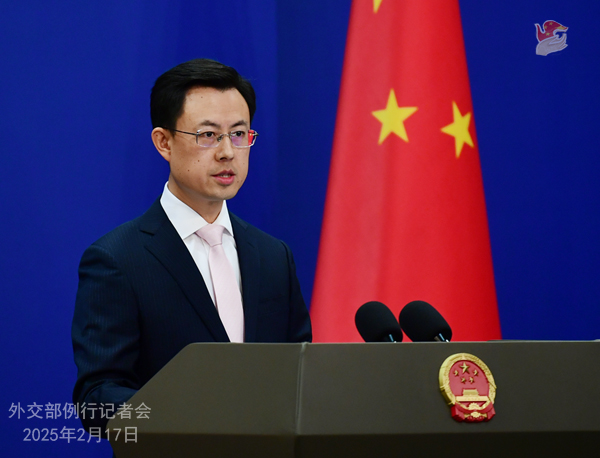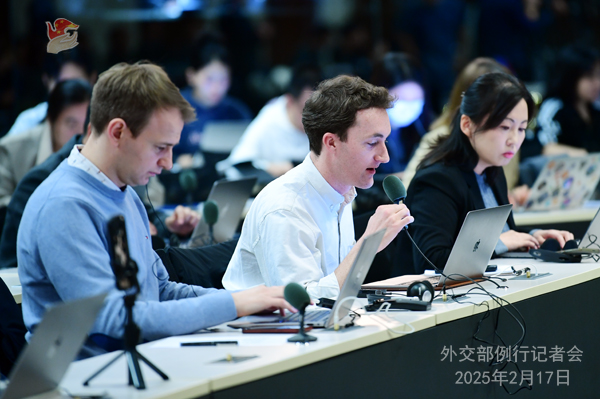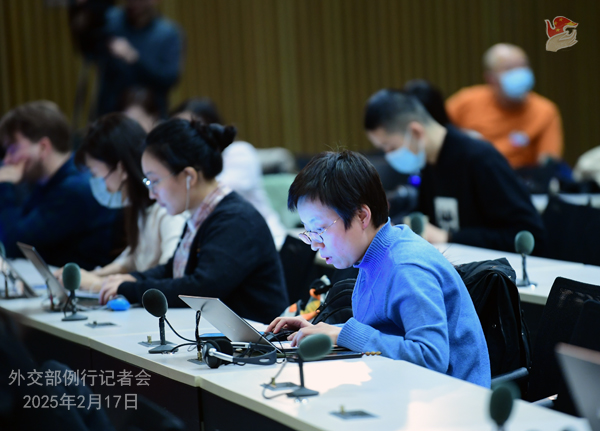
Global Times: At this year’s Munich Security Conference which focused on multipolarization, Foreign Minister Wang Yi delivered an address. Could you share more information? Is China a growing polar in a multipolar world?
Guo Jiakun: A multipolar world is not only a historical inevitability; it is also becoming a reality. What multipolarity does the world need? In the keynote speech at the Munich Security Conference, Foreign Minister Wang Yi further shared China’s answer, i.e., work for an equal and orderly multipolar world.
An equal world offers equal rights, equal opportunities and equal rules. The core proposition is equality among all countries regardless of size. Each and every country or country group should have its place in the globalized system. International affairs are not dominated by only a handful of countries, and more importantly, hegemonism and power politics should be rejected.
An orderly world ensures stable progress toward greater multipolarity instead of leading to turbulence. To this end, all countries need to respect international rule of law, practice multilateralism, pursue openness and mutual benefit, jointly uphold the purposes and principles of the U.N. Charter, preserve the central role of the U.N. in the international system, and promote the common development of every country.
You asked about China’s role in the world’s multipolar structure. Foreign Minister Wang Yi made it amply clear that China will surely be a factor of certainty in this multipolar system, and strive to be a steadfast constructive force in a changing world. We have firmly upheld the authority and stature of the U.N., and called for increasing the representation and say of developing countries in the international system. Every country should have their voice heard and their role valued. China resolutely upholds the authority of international rule of law, and never practices exceptionalism, still less cherry-picking. China upholds true multilateralism, and put forward the Belt and Road Initiative, the Global Development Initiative, the Global Security Initiative and the Global Civilization Initiative, providing public goods for improving global governance. We stay committed to sharing development opportunities with all countries, and promote a universally beneficial and inclusive economic globalization and support an equal and orderly multipolar world through our own high-quality development and high-standard opening up.
AFP: Authorities in South Korea said today that Chinese AI app DeepSeek will not be available to download in the country until the review of its personal data collection practices is carried out. Does the Foreign Ministry have a comment on this?
Guo Jiakun: I’d refer you to competent authorities for anything specific. Let me stress that the Chinese government, as always, asks our companies to strictly abide by local laws and regulations in doing business overseas. We also hope that relevant countries can refrain from broadening the concept of national security on trade and tech issues and politicizing them.
Yonhap News Agency: Foreign Ministers of the ROK, the U.S. and Japan held talks on February 15 in Munich, Germany. The three countries said for the first time in their joint statement that they support “Taiwan’s meaningful participation in appropriate international organizations,” strongly oppose “any unilateral attempts to change the status quo by force or coercion in the waters of the Indo-Pacific, including the South China Sea,” and emphasize “the importance of maintaining peace and stability across the Taiwan Strait.” What’s China’s position on that?
Guo Jiakun: We firmly oppose relevant countries’ attempts to put together small circles to interfere in China’s internal affairs, attack and smear China, and stoke confrontation and antagonism. We’ve lodged serious protests with relevant countries.
Taiwan is an inalienable part of China’s territory. The Taiwan question is purely an internal affair of China, which brooks no external interference. The key to upholding peace and stability in the Taiwan Strait lies in abiding by the one-China principle, and firmly opposing “Taiwan independence” separatism. The Taiwan region’s participation in the activities of international organizations must and can only be handled in line with the one-China principle.
Let me stress that the Asia-Pacific is a stellar example of peace and development, not a chessboard for major-power rivalry. We call on relevant parties to earnestly respect regional countries’ effort for peace and stability, abandon the Cold War mentality, stop creating bloc confrontation and stop fueling tensions in the region. China will firmly safeguard territorial sovereignty and maritime rights and interests, and meanwhile, stays committed to properly handling differences through dialogue and consultation with countries concerned.

Reuters: I would also like to ask about Foreign Minister Wang Yi’s trip to Germany where he met with counterparts from Germany, France and Spain as well as the European Union, and conveyed a message that China is willing to strengthen its relationship with Europe despite trade tensions. What drives China’s desire to now align more closely with the European Union and how does new uncertainty in transatlantic relations between the EU and the U.S. affect China?
Guo Jiakun: As we speak, unilateralism and protectionism are rising, and uncertainties and destabilizing factors are intertwining with each other. The international community aspires for peace and stability, wants a sound and steady China-EU relationship, and expects China and the EU to play a constructive role in this changing world more than ever.
This year marks the 50th anniversary of China-EU diplomatic relations. China stands ready to work with the EU to remain each other’s partners, enhance strategic communication and coordinated cooperation, uphold multilateralism, jointly respond to global challenges, add new vitality and dynamism to China-EU relations, and provide more certainty and stability to this turbulent world.
Bloomberg: Earlier this week, the U.S. State Department removed the words “we do not support Taiwanese independence” from a fact sheet on Taiwan relations on its website. Have you discussed this with the U.S. and do you have any comment now?
Guo Jiakun: There is but one China in the world, Taiwan is part of China and the government of the People’s Republic of China is the sole legal government representing the whole of China. It is a prevailing international consensus and basic norm governing international relations, and also a solemn commitment the U.S. has made in the three China-U.S. joint communiqués.
History cannot be tampered with, facts cannot be denied, and truth cannot be distorted. U.S. State Department updated its fact sheet on relations with Taiwan and gravely backpedaled on its position on Taiwan-related issues. This move severely violates the one-China principle and three China-U.S. joint communiqués, goes against international law and basic norms of international relations, and sends a seriously wrong signal to the separatist forces for “Taiwan independence.” This is another example of the U.S. clinging to its wrong policy of “using Taiwan to contain China.”
We urge the U.S. to immediately correct its wrongdoings, abide by the one-China principle and three China-U.S. joint communiqués, handle the Taiwan question with extra prudence, stop using Taiwan to contain China, stop upgrading its substantive relations with Taiwan, stop helping Taiwan expand so-called “international space,” stop emboldening and supporting “Taiwan independence,” and avoid further severe damage to China-U.S. relations and peace and stability in the Taiwan Strait.
Beijing Youth Daily: The 38th Ordinary Session of the African Union Assembly of the Heads of State and Government on February 15 elected Djibouti’s Foreign Minister Mahmoud Ali Youssouf as the new African Union Commission Chairperson for a four-year tenure. What’s China’s expectations for the China-AU relations going forward?
Guo Jiakun: We congratulate Mr. Mahamoud Ali Youssouf on his election as Chairperson of the African Union Commission (AUC). The AU is a banner of strength through unity for Africa and an important platform for international cooperation. China views its relations with the AU from a strategic and long-term perspective. President Xi Jinping has sent congratulatory messages to the AU Summit for 13 consecutive years and met with the then AU leader during the FOCAC Beijing Summit, which fully speaks to the high level of the China-AU relations.
At present, peace and development in Africa faces new opportunities and challenges. China stands ready to work closely with Chairperson Youssouf and the newly-elected AUC, continues to support the AU’s leading role in advancing African integration and sending out a stronger voice in international and regional affairs, jointly promote the in-depth development of China’s relations with the AU and Africa, and spearhead the effort of the Global South to seek strength through unity and achieve modernization together.
RIA Novosti: U.S. President Donald Trump said earlier that BRICS “died” the moment he threatened to impose 100 percent tariffs on those countries that would move forward with a new currency to challenge the U.S. dollar. I wonder what’s China’s comment on this?
Guo Jiakun: As an important platform for cooperation among emerging markets and developing countries, BRICS advocates openness, inclusiveness and win-win cooperation, not bloc confrontation, and does not target any third party. The aim is to realize common development and prosperity. China stands ready to continue working with BRICS partners to deepen practical cooperation in various fields and make more contributions to the continuous steady growth of the world economy.
On U.S. tariff hikes, China has made clear its position more than once. Trade and tariff wars have no winners and undermine the interests of people from all countries.

Reuters: China has signed an agreement with the Cook Islands. Will the Foreign Ministry be making a public statement? Are you able to tell us anymore about this agreement? New Zealand said it’s very concerned about the contents of the deal. Does the Foreign Ministry have any comment?
Guo Jiakun: On the afternoon of February 14, Premier Li Qiang met with Prime Minister Mark Brown of the Cook Islands in Harbin who was in China for the Closing Ceremony of the Asian Winter Games. During the meeting, the two sides spoke highly of the relationship between China and the Cook Islands, reaffirmed principles guiding the two countries’ interactions, and discussed the prospect of future cooperation. After the meeting, they witnessed the signing of multiple bilateral cooperation documents, including the Action Plan for Comprehensive Strategic Partnership 2025-2030. The Action Plan will provide a road map for the two countries’ cooperation in the economic, environmental, cultural and social fields, among others, and will help the two sides achieve more results in friendly exchanges and practical cooperation in various areas for the benefit of the two peoples.
The cooperation between China and the Cook Islands does not target any third party, and should not be disrupted by any third party. This is China’s consistent position.
Bloomberg: The Japanese Ministry of Justice says that it’s going to revise its family law rules to allow Taiwan, Palestine and other non-national state regions or districts to be listed as a place of origin for people from those places. So currently, someone from Taiwan is listed as coming from China. In the future, they’ll be able to be listed as coming from Taiwan. Does the Foreign Ministry have any comment on this?
Guo Jiakun: Taiwan is an inalienable part of China’s territory and compatriots from both sides of the Taiwan Strait belong to the same Chinese nation. The Taiwan question is purely China’s internal affair that brooks no foreign interference. Japan committed aggression against Taiwan and exercised colonial rule over the island. It bears serious historical responsibilities to the Chinese people, and should act all the more prudently on the Taiwan question. We urge the Japanese side to abide by the one-China principle and the spirit of the four political documents between China and Japan. No gimmicks on the Taiwan question, and do not send any conflicting or wrong signals.
Follow-up: So in your criticism now, are you saying that the change on the family law rules in Japan violates the founding documents of Japan-China relations and violates Chinese sovereignty?
Guo Jiakun: Adherence to the one-China principle and the spirit of the four political documents between China and Japan is a solemn political commitment Japan has made to China. Let me stress again that the Taiwan question is China’s internal affair that brooks no foreign interference.
AFP: Chinese Assistant Minister of Public Security Liu Zhongyi in recent days met with officials in Myanmar about efforts to crack down on cross-border internet scamming operations. According to Thai media reports, Liu Zhongyi traveled yesterday to Thailand where he was expected to escort hundreds of people involved in the scamming operations back to China. Does the Foreign Ministry have details on these plans or on Liu Zhongyi’s trip in the region?
Guo Jiakun: The recent serious crimes involving online gambling and scam happened along the Thailand-Myanmar border threaten the life and property of citizens of China, Thailand and other relevant countries, and disrupt normal exchanges and cooperation between regional countries. Fighting online gambling and scam demonstrates the Chinese government’s commitment to the people-centered development philosophy. It is a must choice for safeguarding the common interests of regional countries, and meets the shared aspiration of the people of all countries.
China is carrying out active bilateral and multilateral cooperation with countries including Thailand and Myanmar. We have adopted various means to address both symptoms and the root cause and worked together to prevent lawbreakers from crossing borders, so as to jointly eradicate the problems of online gambling and scam, safeguard the life and property of the people, and uphold the order of exchanges and cooperation between regional countries.
The Chinese Foreign Ministry will continue working with competent authorities to direct our embassies and consulates overseas to properly handle relevant cases involving consular protection and help, and protect the safety of overseas Chinese and their lawful rights and interests. As for the specific visit you mentioned, I’d refer you to competent authorities.